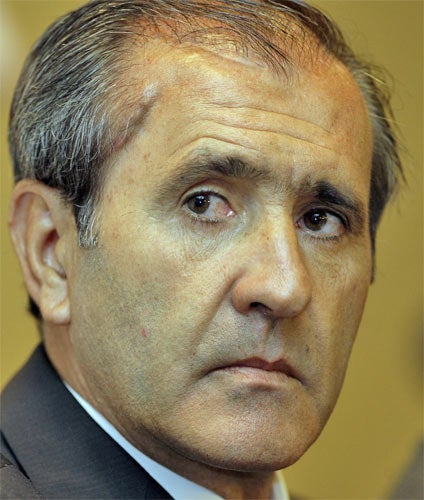'Severe deterioration' in health of Spanish legend Ballesteros

Seve Ballesteros's condition is worsening, according to the Spanish golfing hero's family.
The five-time major winner was diagnosed with a brain tumour in 2008, and underwent four operations as well as several courses of chemotherapy. A family statement yesterday, though, announced his worsening condition: "The Ballesteros family reports that there has been a severe deterioration of the neurological condition of Seve Ballesteros."
The statement went on to express the family's gratitude for the public support Ballesteros has received. "The family will give further information, as and when there is a development in the state of his health," it read. "They would like to take the opportunity to thank everyone who has supported Seve and the family. The family will provide punctual information, through the website www.seveballesteros.com, about the situation of the Spanish champion."
Ballesteros's health concerns began when he collapsed at Madrid airport on 6 October 2008. He underwent a 12-hour operation on his admission to La Paz hospital, having been diagnosed with a malignant tumour. This was the first of four operations to remove the tumour and to reduce swelling in his skull.
Soon after the initial surgery Ballesteros described his cancer battle as "the hardest challenge" of his life. "Throughout my career I have been among the best at overcoming challenges on the golf course," he said. "Now I want to be the best confronting the hardest challenge of my life, with all my strength, counting on all of you who are sending me encouraging messages."
Chemotherapy started soon after his release from hospital in December 2008. Ballesteros had four courses of it up until April 2009. In December 2009, 14 months after his initial diagnosis, he was presented with a Lifetime Achievement award as part of the BBC Sports Personality of the Year. The award was given to him at his home by his friend and Ryder Cup team-mate Jose Maria Olazabal.
Ballesteros, now 54 years old, won 87 titles in a glittering golfing career. He won the Open three times; first at Royal Lytham & St Annes in 1979, which made him the youngest Open champion of that century, then at St Andrews in 1984 and then back at Lytham St Annes in 1988. He won the 1980 Masters, and was the first European to do so. He was only 23 at the time of that victory, the youngest ever Masters champion, although Tiger Woods broke his record in 1997. He regained the Masters in 1983, the third of his five major titles.
In matchplay, Ballesteros played in eight Ryder Cups, between 1979 and 1995, and was on the winning side in 1985, 1987 and 1995, as well as retaining after a tie in 1989. In 1997 he captained Europe to a famous 14 and a half to 13 and a half win over the US at the Valderrama Golf Club in Spain. The Seve Trophy, a biennial golf tournament between teams from the British Isles and continental Europe, is named after him.
Join our commenting forum
Join thought-provoking conversations, follow other Independent readers and see their replies
Comments
Bookmark popover
Removed from bookmarks